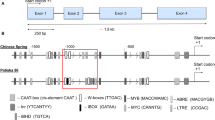Abstract
The myeloblastosis oncogenes (MYB) are one of the important transcription factors that facilitate induction of various developmental and stress responsive genes. They are hence, emerging as key players in improving stress tolerance of plants in response to several abiotic stresses. Therefore, isolation and characterization of these genes, development of transgenics and functional molecular markers for useful alleles is central to various crop improvement programs. In this manuscript, we for the first time are reporting the identification of a synonymous single nucleotide polymorphism associated with dehydration tolerance at 458th bp (an A/G transition) in the TaMYB2 gene of wheat (Triticum aestivum L.) and development of an allele-specific marker (ASM) for dehydration tolerance for the same. Further we validated this TaMYB2-ASM in a core set of 28 wheat cultivars which can be used for marker-assisted selection for dehydration tolerance in plant breeding programs.




Similar content being viewed by others
References
Burke EJ, Brown SJ, Christidis N (2006) Modeling the recent evolution of global drought and projections for the twenty-first century with the Hadley centre climate model. J Hydrometeorol 7:1113–1125
Shewry PR (2009) Wheat. J Exp Bot 60:1537–1553
Chaves MM, Oliveira MM (2004) Mechanisms underlying plant resilience to water deficits: prospects for water saving agriculture. J Exp Bot 55:2365–2384
Agarwal PK, Agarwal P, Reddy MK, Sopory SK (2006) Role of DREB transcription factors in abiotic and biotic stress tolerance in plants. Plant Cell Rep 25:1263–1274
Lata C, Prasad M (2011) Role of DREBs in regulation of abiotic stress responses in plants. J Exp Bot 62:4731–4748
Lata C, Bhutty S, Bahadur RP, Majee M, Prasad M (2011) Association of a SNP in a novel DREB2-like gene SiDREB2 with stress tolerance in foxtail millet [Setaria italica (L.)]. J Exp Bot 62:3387–3401
Martin C, Paz-Ares J (1997) MYB transcription factors in plants. Trends Genet 13:67–73
Abe H, Urao T, Ito T, Seki M, Shinozaki K, Yamaguchi-Shinozaki K (2003) Arabidopsis AtMYC2 (bHLH) and AtMYB2 (MYB) function as transcriptional activators in abscisic acid signaling. Plant Cell 15:63–78
Urao T, Yamaguchi-Shinozaki K, Urao S, Shinozaki K (1993) An Arabidopsis myb homolog is induced by dehydration stress and its gene product binds to the conserved MYB recognition sequence. Plant Cell 5:1529–1539
Gong Z, Koiwa H, Cushman MA, Ray A, Bufford D, Kore-eda S, Matsumoto TK, Zhu J, Cushman JC, Bressan RA, Hasegawa PM (2001) Genes that are uniquely stress regulated in salt overly sensitive (sos) mutants. Plant Physiol 126:363–375
Lata C, Sahu PP, Prasad M (2010) Comparative transcriptome analysis of differentially expressed genes in foxtail millet (Setaria italica L.) during dehydration stress. Biochem Biophys Res Commun 393:720–772
Thompson JD, Higgins DG, Gibson TJ (1994) CLUSTAL W: improving the sensitivity of progressive multiple sequence alignment through sequence weighting, position-specific gap penalties and weight matrix choice. Nucleic Acids Res 22:4673–4680
Horton P, Park K-J, Obayashi T, Fujita N, Harada H, Adams-Collier CJ, Nakai K (2007) WoLF PSORT: protein localization predictor. Nucleic Acids Res 35:W585–W587
Livak KJ, Schmittgen TD (2001) Analysis of relative gene expression data using real-time quantitative PCR and the 2−ΔΔCt method. Methods 25:402–408
Dai X, Xu Y, Ma Q, Xu W, Wang T, Xue Y, Chong K (2007) Overexpression of an R1R2R3 MYB gene, OsMYB3R-2, increases tolerance to freezing, drought, and salt stress in transgenic Arabidopsis. Plant Physiol 143:1739–1751
Yun K-Y, Park MR, Mohanty B, Herath V, Xu F, Mauleon R, Wijaya E, Bajic VB, Bruskeiwich R, de los Reyes BG (2010) Transcriptional regulatory network triggered by oxidative signals configures the early response mechanisms of japonica rice to chilling stress. BMC Plant Biol 10:16
Mao X, Jia D, Li A, Zhang H, Tian S, Zhang X, Jia J, Jing R (2011) Transgenic expression of TaMYB2A confers enhanced tolerance to multiple abiotic stresses in Arabidopsis. Funct Integr Genomics 11:445–465
Garg B, Jaiswal JP, Misra S, Tripathi BN, Prasad M (2012) A comprehensive study on dehydration-induced antioxidative responses during germination of Indian bread wheat (Triticum aestivum L. em Thell) cultivars collected from different agroclimatic zones. Physiol Mol Biol Plants 18:217–228
Garcés-Claver A, Fellman SM, Gil-Ortega R, Jahn M, Arnedo-Andrés MS (2007) Identification, validation and survey of a single nucleotide polymorphism (SNP) associated with pungency in Capsicum spp. Theor Appl Genet 115:907–916
Gupta PK, Roy JK, Prasad M (2001) Single nucleotide polymorphisms: A new paradigm for molecular marker technology and DNA polymorphism detection with emphasis on their use in plants. Curr Sci 80:524–535
Anderson JR, Lübberstedt T (2003) Functional markers in plants. Trends Plant Sci 8:554–560
Lu CM, Yang WY, Zhang WJ, Lu B-R (2005) Identification of SNPs and development of allelic specific PCR markers for high molecular weight glutenin subunit Dtx1.5 from Aegilops tauschii through sequence characterization. J Cereal Sci 41:13–18
Fan C, Yu S, Wang C, Xing Y (2009) A causal C-A mutation in the second exon of GS3 highly associated with rice grain length and validated as a functional marker. Theor Appl Genet 118:465–472
Ramkumar G, Sivranjani AKP, Pandey MK, Sakthivel K, Rani NS, Sudarshan I, Prasad GSV, Neeraja CN, Sundaram RM, Madhav MS (2010) Development of a PCR-based SNP marker system for effective selection of kernel length and kernel elongation in rice. Mol Breed 26:735–740
Ciarmiello LF, Piccirillo P, Pontecorvo G, Luca AD, Kafantaris I, Woodrow P (2011) A PCR based SNPs marker for specific characterization of English walnut (Juglans regia L.) cultivars. Mol Biol Rep 38:1237–1249
Acknowledgments
We are thankful to Prof. Jai P Jaiswal of GBPUAT, Pantnagar, Uttarakhand, India for providing the seed materials. Charu Lata acknowledges the award of INSPIRE Faculty from Department of Science & Technology, Govt. of India (Grant No. IFA-11LSPA-01), New Delhi. The study was supported by Department of Science & Technology, Govt. of India.
Author information
Authors and Affiliations
Corresponding author
Rights and permissions
About this article
Cite this article
Garg, B., Lata, C. & Prasad, M. A study of the role of gene TaMYB2 and an associated SNP in dehydration tolerance in common wheat. Mol Biol Rep 39, 10865–10871 (2012). https://doi.org/10.1007/s11033-012-1983-3
Received:
Accepted:
Published:
Issue Date:
DOI: https://doi.org/10.1007/s11033-012-1983-3




